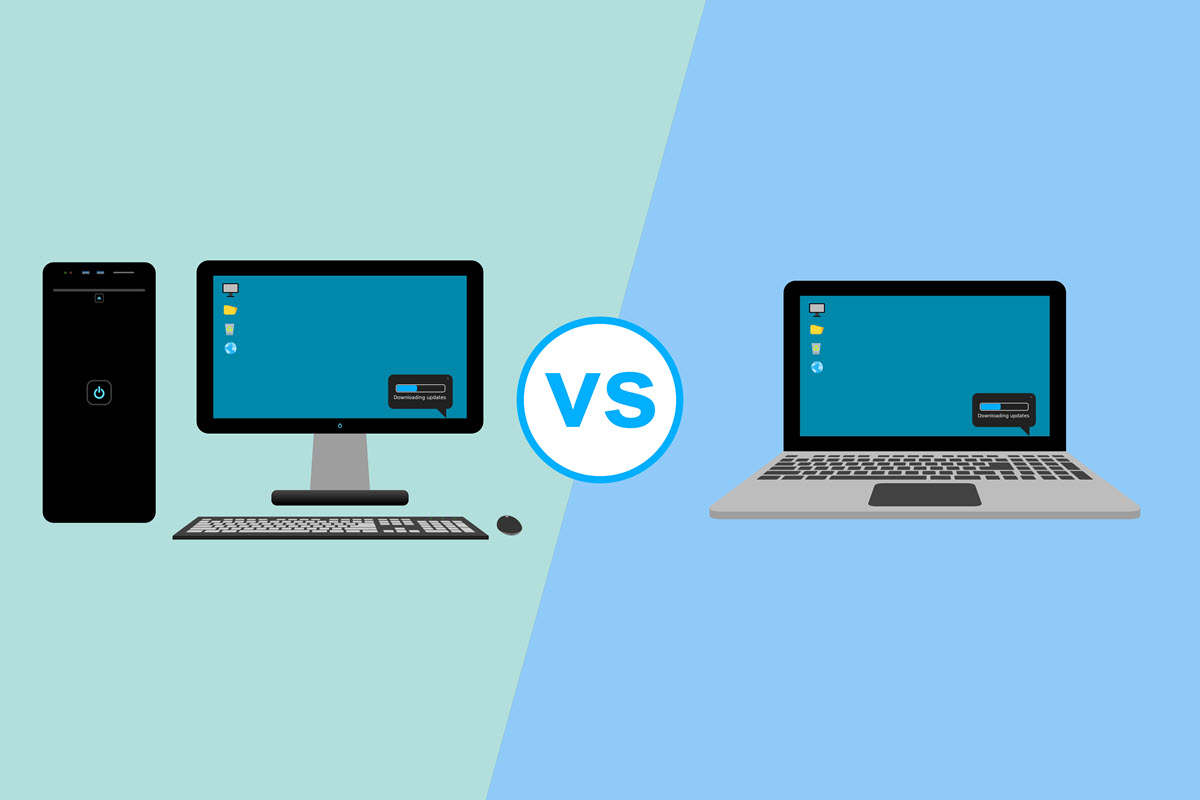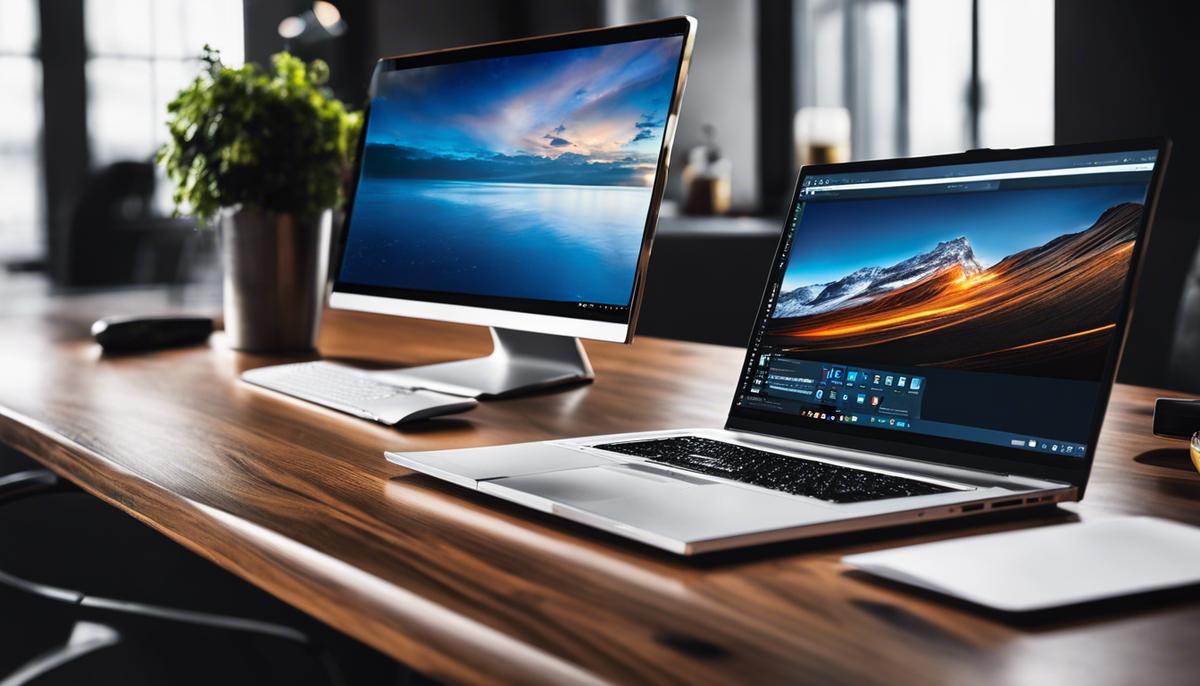Laptop vs Desktop: Unveiling the Best Tech Choice

Estimated reading time: 9 minutes
Table of contents
In today’s technologically advanced world, devices we utilize to accomplish our work and connect with others play a significant role. Often, this boils down to a choice between a laptop and a desktop computer. Yet, determining which one is most suitable for individual needs involves a multifaceted analysis.
This comprehensive exploration includes the performance capabilities, portability, convenience, cost-effectiveness, and value proposition of laptops and desktops. The examination assesses critical factors such as processing speed, storage space, graphics handling, multitasking capabilities, build, weight, initial cost, maintenance costs, and more.
This analysis aims to help you make an informed decision about the best computer for your needs by presenting a balanced view of both desktops and laptops. By extension, a laptop or desktop PC is a core part of modern life. Today, you may need one to work from home or even manage a business venture you found on sites like Franchise Local.
Performance Comparison Between Laptops and Desktops
In the technological world of advancement, where productivity and performance are king, desktops, and laptops continually vie for supremacy. These tech staples have traversed the conventional boundary of usage, stepping into domains where they’re not just tools anymore but integral parts of our lives. This article deep-dives into the performance capabilities of laptops and desktops and how they shape users’ choices.
Performance capabilities form a strong foundation when weighing the pros and cons of laptops and desktops. For decades, desktops ruled the roost with their reliable performance, unbeatable processing power, and fantastic customization options, making them an ideal choice for tech enthusiasts and professionals. Limitations hardly existed as their larger casing allowed for more sophisticated hardware, amplifying the overall performance.
On the other hand, laptops have beautifully evolved from simple portable devices to powerhouses of performance today. The latest models boast incredible specifications, offering exponential processing power, memory, and high-end graphics capabilities that rival even the most robust desktop computers. Yet, despite these advancements, the question still stands—does a laptop truly match a desktop’s performance?
At the outset, the answer appears nuanced. For tasks inherently less intensive, such as word processing, web browsing, video streaming, and the like, the performance discrepancy between a laptop and a desktop is hardly noticeable.
SEE ALSO: Why a Laptop Is Better Than a Desktop When Heading Off to College
However, when we shift this conversation to more intensive tasks – think high-end gaming, 3D rendering, video editing, or running complex algorithms – that’s where the difference becomes glaring. Desktops outpace laptops effortlessly owing to their thermal efficiency, larger power supply, and superior components tailored for intense tasks. The most significant advantage is the ease of upgrades – while laptops offer upgrade options, they pale compared to the extent of customization desktops provide.
But if your gaming skills only extend to playing checkers, the high-end performance capabilities of a desktop may not be essential to meeting all your computing needs. A laptop could meet them – match your device according to your requirements and needs. Daily tasks and moderate use are ideal opportunities to use laptops in this capacity without breaking the bank for cutting-edge hardware.
Another critical aspect perturbing the laptops vs. desktops debate is longevity. Desktops typically have a longer lifespan, primarily attributable to better cooling systems, the ability to clean and maintain, and easier replacement of worn or obsolete parts. Nonetheless, laptops are increasingly closing this gap with advancing technology.
Portability, a natural advantage of laptops, also contributes to performance. Working or playing anywhere can indirectly enhance overall productivity and satisfaction. Although the desktop-to-docking station connectivity helps mimic this portability, it cannot fully capture a laptop’s unique convenience.
In the final analysis, choosing between a laptop and a desktop does not merely hinge upon direct performance comparison. Instead, it pivots on an individual or a business’s needs, preferences, and work environments. While a desktop’s raw power and upgradeability of the desktop might attract professional gamers, developers, graphic designers, or data scientists, the portability and strong enough ‘performance-per-pound’ would resonate more with travelers, students, or entrepreneurs.
In the continually evolving tech landscape, distinguishing clear winners could be restrictive and unnecessary. Instead, understanding distinctive performance capabilities and tuning in to personal requirements can help make the right choice.

Portability and Convenience of Laptops Versus Desktops
Let’s focus on two crucial variables that often tip the scales in the laptop vs. desktop debate: portability and Convenience.
Moving into the 21st century, the demand for mobile workstations has surged exponentially. With their compact design and lightweight nature, laptops fit perfectly into this demand dynamic. They’re like portable powerhouses, enabling users to work, play, or consume media anytime, anywhere. With an in-built battery, laptops ensure work continuity even during power outages, an advantage that desktops lack. This portability does not just cater to the on-the-move professional but also to every college student, frequent traveler, or casual user who values the privilege of versatility.
The compactness of laptops, however, does serve as a minor setback. Despite ongoing advancements in streamlining and miniaturizing tech components, laptops still grapple with restricted upgrade possibilities. Desktops, in contrast, embrace versatility in hardware customization. Their spacious design allows users to beef up their machines, increasing the lifespan of their investment. A desktop is an undisputed winner for a tech enthusiast who cherishes the freedom to tweak their system constantly.
Convenience is a subjective variable that is defined differently by different users. For some, it could be the simplicity of having everything—the CPU, monitor, and speakers—packed into one portable machine, negating the need for a dedicated workspace. For a few others, it may mean browsing in bed, gaming from the couch, or giving a business presentation on the go, functions that are quintessentially restricted with a desktop setup.
SEE ALSO: Which Is Better: Wired or Wireless?
However, on the other side, users who prefer multiple monitor setups, superior graphics, and a more ergonomic workspace find desktops significantly more convenient. They have the liberty to choose a bigger monitor, a more comfortable keyboard, and a suitable mouse, thus weaving in an environment that adapts to their comfort rather than them adapting to the machine.
The bifurcation is not absolute. It is quite plausible to fall into one category for one set of activities and another for another set. For instance, a gaming enthusiast could prefer a desktop for gaming but may lean towards a laptop for everything else.
In the end, while laptops and desktops fundamentally perform identical functions, the priorities of portability and convenience often become the dividing line, and correctly so. The user’s requirement is precisely where the focus should be. After all, the best technology is the one that complements the user’s lifestyle and work habits, not one that compels adaptation. Recognizing this differentiation remains essential to making informed decisions as we navigate an evolving landscape of technological advancements.

Cost-Effectiveness and Value Proposition: Laptops and Desktops
Stepping away from the conversation around performance, it is crucial to examine further the cost-effectiveness and overall value that desktops and laptops offer users across many scenarios and user requirements.
Initially, regarding cost, desktops tend to offer a higher price-performance ratio. For a given cost, desktops usually provide more powerful hardware specifications – such as faster processors, larger hard drives, or more robust graphics cards – than their laptop counterparts. This cost advantage can be significant, particularly for those seeking the maximum performance from their machines, such as gamers or developers.
Moreover, the expansive room for upgrades that desktops provide can amplify the device’s lifecycle and provide long-term cost-effectiveness. Unlike laptops, desktops enable piecemeal upgrades, from adding more RAM or storage to swapping out the motherboard for the latest model. Therefore, the investment in a desktop is more likely to extend beyond the initial cost, offering ongoing value over the years.
However, cost-effectiveness is more than just a matter of raw power or long-term investments. In this era of ‘work from anywhere,’ laptops offer a distinct advantage with their inherent portability. The flexibility to operate from virtually anywhere with a power outlet translates into value that can be hard to measure in monetary terms. Considering the trend toward flexible workplaces and remote collaboration, the convenience offered by laptops can directly contribute to increased productivity and work-life balance.
Due to their compact and intricate design, laptops usually require professional help in terms of maintenance. Desktops, on the other hand, are usually easier and cheaper to maintain and repair, thanks to their larger and more modular construction, adding another point to their cost-effectiveness tally.
Nonetheless, it’s important to consider the energy efficiency of these devices. Laptops are designed to run on batteries and are, therefore, more energy-efficient than desktops, which may save electricity costs over time.
Other tangible costs include peripherals such as monitors, keyboards, and mice, which often need to be purchased separately from desktops, whereas these are included with laptops. This aspect can notably influence the total cost for users.
To sum up, equating cost-effectiveness and overall value to merely performance metrics doesn’t capture the full picture of what laptops and desktops have to offer diverse user requirements. Beyond the initial cost, considering mobility, maintenance cost, energy efficiency, and personalized needs will entail a more accurate understanding of the value proposition these devices provide.
Understanding the merits of both desktops and laptops can be integral to your decision-making process. It’s vital to remember that there isn’t a one-size-fits-all answer to this age-old debate. The ultimate choice hinges on individual priorities, requirements, and the balance between performance and portability. The bottom line? Stay informed, understand your needs, and remember technology’s role is to serve us, enabling more efficient and enriching lives – whether from a desktop or a laptop’s keyboard.

After traversing through the various aspects of laptops and desktops, we take a step back to review the entire panorama. There is a clear reality that each device presents unique capabilities and advantages. Your best choice ultimately hinges upon assessing your needs, usage patterns, budget, and lifestyle.
Whether you’re a student, digital nomad, business professional, or a dedicated gamer, there’s a perfect device out there. By understanding the comprehensive performance abilities, user experience factors, and the economic implications of owning and operating either device, you can align your selection with your requirements. Arrive at an insightful decision that favors your aspirations, and remember — be it a laptop or a desktop, what matters the most is how you utilize these technological marvels to unfurl your potential.








